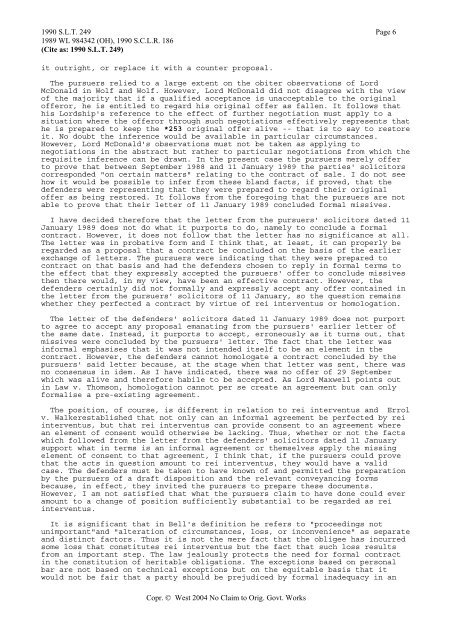Tesco v Constain - Thomson Reuters
Tesco v Constain - Thomson Reuters
Tesco v Constain - Thomson Reuters
You also want an ePaper? Increase the reach of your titles
YUMPU automatically turns print PDFs into web optimized ePapers that Google loves.
1990 S.L.T. 249 Page 61989 WL 984342 (OH), 1990 S.C.L.R. 186(Cite as: 1990 S.L.T. 249)it outright, or replace it with a counter proposal.The pursuers relied to a large extent on the obiter observations of LordMcDonald in Wolf and Wolf. However, Lord McDonald did not disagree with the viewof the majority that if a qualified acceptance is unacceptable to the originalofferor, he is entitled to regard his original offer as fallen. It follows thathis Lordship's reference to the effect of further negotiation must apply to asituation where the offeror through such negotiations effectively represents thathe is prepared to keep the *253 original offer alive -- that is to say to restoreit. No doubt the inference would be available in particular circumstances.However, Lord McDonald's observations must not be taken as applying tonegotiations in the abstract but rather to particular negotiations from which therequisite inference can be drawn. In the present case the pursuers merely offerto prove that between September 1988 and 11 January 1989 the parties' solicitorscorresponded "on certain matters" relating to the contract of sale. I do not seehow it would be possible to infer from these bland facts, if proved, that thedefenders were representing that they were prepared to regard their originaloffer as being restored. It follows from the foregoing that the pursuers are notable to prove that their letter of 11 January 1989 concluded formal missives.I have decided therefore that the letter from the pursuers' solicitors dated 11January 1989 does not do what it purports to do, namely to conclude a formalcontract. However, it does not follow that the letter has no significance at all.The letter was in probative form and I think that, at least, it can properly beregarded as a proposal that a contract be concluded on the basis of the earlierexchange of letters. The pursuers were indicating that they were prepared tocontract on that basis and had the defenders chosen to reply in formal terms tothe effect that they expressly accepted the pursuers' offer to conclude missivesthen there would, in my view, have been an effective contract. However, thedefenders certainly did not formally and expressly accept any offer contained inthe letter from the pursuers' solicitors of 11 January, so the question remainswhether they perfected a contract by virtue of rei interventus or homologation.The letter of the defenders' solicitors dated 11 January 1989 does not purportto agree to accept any proposal emanating from the pursuers' earlier letter ofthe same date. Instead, it purports to accept, erroneously as it turns out, thatmissives were concluded by the pursuers' letter. The fact that the letter wasinformal emphasises that it was not intended itself to be an element in thecontract. However, the defenders cannot homologate a contract concluded by thepursuers' said letter because, at the stage when that letter was sent, there wasno consensus in idem. As I have indicated, there was no offer of 29 Septemberwhich was alive and therefore habile to be accepted. As Lord Maxwell points outin Law v. <strong>Thomson</strong>, homologation cannot per se create an agreement but can onlyformalise a pre-existing agreement.The position, of course, is different in relation to rei interventus and Errolv. Walkerestablished that not only can an informal agreement be perfected by reiinterventus, but that rei interventus can provide consent to an agreement wherean element of consent would otherwise be lacking. Thus, whether or not the factswhich followed from the letter from the defenders' solicitors dated 11 Januarysupport what in terms is an informal agreement or themselves apply the missingelement of consent to that agreement, I think that, if the pursuers could provethat the acts in question amount to rei interventus, they would have a validcase. The defenders must be taken to have known of and permitted the preparationby the pursuers of a draft disposition and the relevant conveyancing formsbecause, in effect, they invited the pursuers to prepare these documents.However, I am not satisfied that what the pursuers claim to have done could everamount to a change of position sufficiently substantial to be regarded as reiinterventus.It is significant that in Bell's definition he refers to "proceedings notunimportant"and "alteration of circumstances, loss, or inconvenience" as separateand distinct factors. Thus it is not the mere fact that the obligee has incurredsome loss that constitutes rei interventus but the fact that such loss resultsfrom an important step. The law jealously protects the need for formal contractin the constitution of heritable obligations. The exceptions based on personalbar are not based on technical exceptions but on the equitable basis that itwould not be fair that a party should be prejudiced by formal inadequacy in anCopr. © West 2004 No Claim to Orig. Govt. Works
















